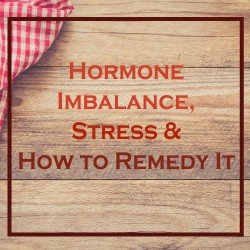-
No products in the cart.
Hormone Imbalance, Stress and How to Remedy It

Hormones play a critical role in our body – they carry messages between cells and organs and affect our body functions – from growth and sexual development to managing our mood, stress, sleep cycles, metabolism and appetite. Realizing how much influence our hormones have over the various systems in our body, we can kind of get an idea of what would happen if our hormones were to go out of balance.
There are various internal and external factors that could cause hormone fluctuations and imbalance which includes puberty, menopause, toxins in our body and even an unbalanced lifestyle.
Today we’ll be focusing one other important cause of hormone imbalance: stress. As well as how to remedy it.
Let’s face it, we can’t avoid stress. Whether from our school to our workplace, we will always experience some sort of stress within our daily lives. Of course, a little bit of it is considered a good thing – it activates our fight-or-flight response, helping us to focus, accomplish tasks more efficiently and can even help boost our memory. However, too much stress can be detrimental to both our physical and mental health.
So how does stress lead to hormone imbalance?
When we’re under stress, the endocrine system increases production of a number of hormones including cortisol (the “stress hormone”), catecholamines, growth hormones and prolactin (changing and shifting our hormone levels); which in turn helps the individual to adapt to the new situation they’re facing.
Unfortunately, prolonged exposure to stress can result in overproduction and retention of these certain hormones which can lead to hormonal imbalance – resulting in the disruption of certain body functions and systems. Symptoms that indicate a potential hormonal war would be:
– Persistent weight gain
– Belly fat and loss of muscle mass
– Low libido
– Fatigue
– Anxiety, irritability and depression
– Insomnia and poor sleep patterns
– Digestion problems and changes in appetite
– Cravings
So is there a solution to this problem?
No worries, here are a few tips to help you combat hormonal imbalance in your day-to-day lives:
1. Eat enough healthy fats
As your body needs a variety of essential fats to create hormones, eating a variety of foods that are high in short, medium and long-chain fatty acids (yes, even a tiny bit of saturated fat and cholesterol) will be a good way to keep your hormone production up and balance in check. The best sources of healthy fats among others are from coconut oil, avocados, grass-fed butter and salmon.
2. Engage in regular exercise
Proper and regular exercise is needed to maintain proper health and wellbeing – which also includes hormonal health as it helps regulate hormones in the body. In terms of lowering cortisol (the “stress” hormone) in the body, light exercises such as yoga, Pilates, swimming, hiking or tai chi are great options. It’s also important to note that research indicates higher intensity workouts such as running may actually increase cortisol levels. So, if you’re aiming to decrease your stress hormones, then it might be better to take break from the intense workouts and choose a more relaxing alternative.
3. Learn how to manage stress
In order to help get your cortisol and adrenaline levels down from stress, try engaging in stress-reducing activities such as meditation, yoga, massages and even listening to relaxing music. There is even research that has shown that massage therapy can not only reduce cortisol levels by 31% but can also increase mood-boosting hormone, serotonin, by 28% and dopamine by 31%. Try to engage about 10-15 minutes of stress-relieve activities (even if your schedule might be pretty hectic)
4. Avoid overeating and undereating
Hormonal shifts can happen due to eating too much or too little. Overeating has been shown to increase insulin levels and reduce insulin sensitivity whilst on the other hand, cutting away too much on your calorie intake can increase levels of stress and therefore increase cortisol levels (which is known to promote weight gain at elevated levels). Eating within your personal healthy calorie range can help you maintain healthy hormonal balance and weight.
5. Get consistent, high-quality sleep
Aim for at least 7 hours of high-quality sleep per night in order to maintain good hormone balance. As research has shown that poor sleep is linked with imbalanced levels of various hormones such as insulin, cortisol, leptin, ghrelin and growth hormones; which can lead to increased hunger and cravings of high-calorie and carb foods and decreased insulin sensitivity.
6. Try consuming adaptogen foods
Adaptogen foods are specific foods that have the ability to promote hormone balance as well as help protect the body from various diseases – even those that are caused by excess, prolonged stress. One of those foods would be the maca root. Maca (also known as peruvian ginseng) is known to nourish and rejuvenate the endocrine system, helping to regulate hormone systems, positively affecting our mood, growth, sexual development, energy levels and tissue functions.
The bottom line is, hormones are crucial and are involved in almost every aspect of our body’s systems. We need them in order for our bodies to function properly and stay healthy.
Imbalance of our hormonal systems may increase our risk of developing chronic illnesses such as obesity, diabetes and heart disease to name a few.
Of course, while stress is unavoidable in our daily lives, we can still find ways to curb its side effects on our endocrine system and bring balance back to our hormone levels through proper rest, consumption of nutritious foods, exercising regularly and even engaging in mood improving activities.
Sources:
Axe, J. (2018). How to Balance Hormones Naturally. Retrieved from: https://draxe.com/10-ways-balance-hormones-naturally/
Bigus, C. (n.a.). 9 signs You Have A Hormonal Imbalance + Easy Ways to Fix It. Retrieved from: https://www.mindbodygreen.com/0-9523/9-signs-you-have-a-hormonal-imbalance-easy-ways-to-fix-it.html
Hormone Health Network. (n.a.). Hormones. Retrieved from: https://www.hormone.org/hormones-and-health/hormones
Spritzler, F. (2017). 12 Natural Ways to Balance Your Hormones. Retrieved from: https://www.healthline.com/nutrition/balance-hormones
Sullivan, D. (2018). What Exactly is a Hormone Imbalance – and What’s a Girl to do about it?. Retrieved from: https://www.healthline.com/health/hormone-imbalance#1
Women in Balance Institute. (n.a.). Cause of Hormone Imbalance. Retrieved from: https://womeninbalance.org/seventh-woman/causes/

